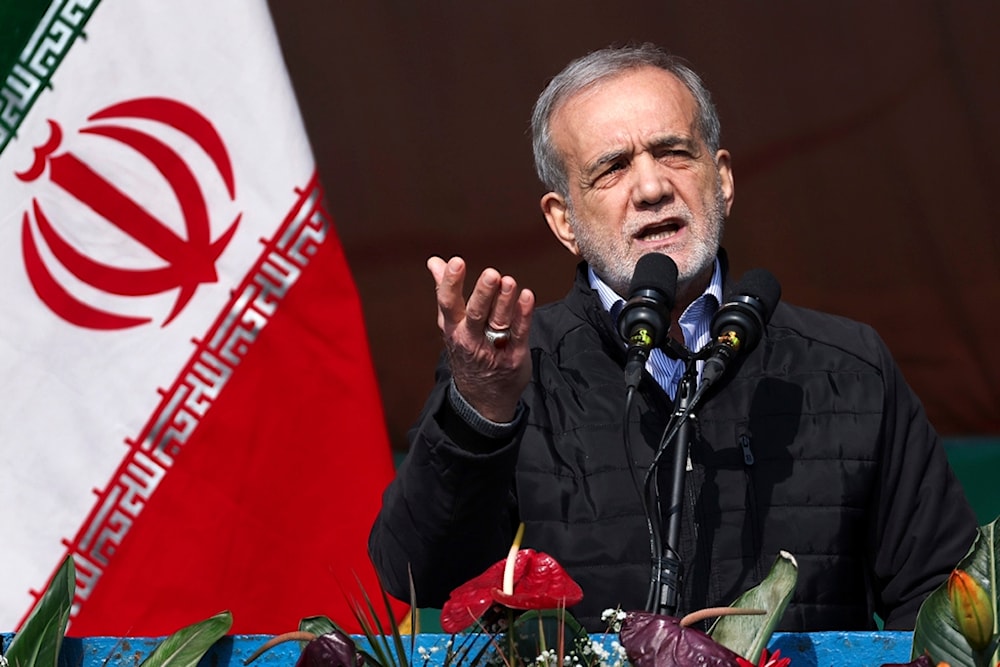Pezeshkian tells MBS Iran not in pursuit of war, calls for unity
Iranian President Masoud Pezeshkian tells Saudi Crown Prince Mohammed bin Salman that his country would not relent in case it had to defend its own territory.
-

In this photo released by the Iranian Presidency Office, President Masoud Pezeshkian speaks during a rally commemorating the Islamic Revolution in Tehran, Iran, on Monday, February 10, 2025 (AP)
Iranian President Masoud Pezeshkian held a phone call with Saudi Crown Prince Mohammed bin Salman on Thursday evening, during which they exchanged Eid al-Fitr greetings and discussed regional developments, according to the Iranian presidency.
During the conversation, Pezeshkian emphasized that Iran does not seek war but will not hesitate to defend its sovereignty, stating, "We are not looking for war, but we will not hesitate to defend our sovereignty, and we have strong capabilities for that."
The Iranian president reaffirmed that Iran has never pursued war or conflict and reiterated that "non-peaceful use of nuclear energy has no place in our security and defense doctrine."
He further stressed that "there is no room for nuclear weapons in our defense doctrine, and Iran is ready for dialogue and constructive cooperation to reduce tensions based on the principle of mutual respect."
Regional stability, unity
Pezeshkian also highlighted the role of Islamic nations in fostering regional stability, asserting that "Muslim countries can establish security and stability in the region by strengthening unity and harmony among themselves."
He added that "if Muslims were united, they could put an end to the ongoing crimes committed against some Muslim peoples, including the Palestinian people."
On Tuesday, the Pentagon announced additional troop deployments and the extension of two aircraft carriers, USS Truman and USS Vinson, in the region.
Last week, several B-2 stealth bombers were dispatched to the Diego Garcia military base in the Indian Ocean. A US official said this deployment was “not unrelated” to Trump’s two-month deadline for Iran.
These bombers, capable of carrying large bunker-buster bombs, would play a crucial role in any potential strikes on Iran’s underground nuclear facilities.
"Should Iran or its proxies threaten American personnel and interests in the region, the U.S. will take decisive action to defend our people," Pentagon spokesperson Sean Parnell warned.
US weighing indirect talks
The White House is seriously evaluating an Iranian proposal for indirect nuclear negotiations while significantly expanding US military forces in the Middle East, preparing for potential military action if President Donald Trump opts for strikes, Axios reported, citing two US officials.
Although Trump has expressed a preference for reaching a deal, he has also warned that failure to do so would lead to "bombing". He set a two-month deadline for Iran to negotiate an agreement, but it remains unclear when that countdown began.
Within the US administration, there is ongoing debate between those who believe a deal is achievable and those who dismiss negotiations as futile and advocate for strikes on Iran’s nuclear facilities, the report revealed.
Over the weekend, Trump received Iran’s official response to the letter he sent the Leader of the Islamic Revolution, Sayyed Ali Khamenei, three weeks earlier, according to a US official. While Trump proposed direct negotiations, Iran agreed only to indirect talks mediated by Oman.
Trump unilaterally withdrew from the 2015 nuclear agreement, arguing that his “maximum pressure” strategy would force Iran into a better deal. However, neither he nor President Joe Biden secured a new agreement.
In the meantime, Iran has significantly advanced its uranium enrichment program, reaching a nuclear threshold status, though Tehran insists it does not seek to develop nuclear weapons.
Iran has also refused to negotiate on non-nuclear issues, including its missile program, which Trump’s administration had previously insisted must be part of any talks.

 4 Min Read
4 Min Read








